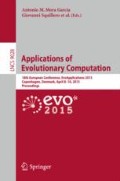Abstract
A challenging aspect in open ad hoc networks is their resilience against malicious agents. This is especially true in complex, urban-scale scenarios where numerous moving agents carry mobile devices that create a peer-to-peer network without authentication. A requirement for the proper functioning of such networks is that all the peers act legitimately, forwarding the needed messages, and concurring to the maintenance of the network connectivity. However, few malicious agents may easily exploit the movement patterns in the network to dramatically reduce its performance. We propose a methodology where an evolutionary algorithm evolves the parameters of different malicious agents, determining their types and mobility patterns in order to minimize the data delivery rate and maximize the latency of communication in the network. As a case study, we consider a fine-grained simulation of a large-scale disruption-tolerant network in the city of Venice. By evolving malicious agents, we uncover situations where even a single attacker can hamper the network performance, and we correlate the performance decay to the number of malicious agents.
Access this chapter
Tax calculation will be finalised at checkout
Purchases are for personal use only
Notes
- 1.
\(\mu \)GP is available from http://ugp3.sourceforge.net.
References
Jain, S., Fall, K., Patra, R.: Routing in a delay tolerant network. In: Proceedings of the 2004 Conference on Applications, Technologies, Architectures, and Protocols for Computer Communications, SIGCOMM 2004, pp. 145–158. ACM, New York (2004)
Borrel, V., Ammar, M.H., Zegura, E.W.: Understanding the wireless and mobile network space: a routing-centered classification. In: Proceedings of the Second ACM Workshop on Challenged Networks, CHANTS 2007, pp. 11–18. ACM, New York (2007)
Jenkins, A., Kuzminsky, S., Gifford, K., Pitts, R., Nichols, K.: Delay/disruption-tolerant networking: flight test results from the international space station. In: Aerospace Conference, 2010 IEEE, pp. 1–8, March 2010
Burgess, J., Gallagher, B., Jensen, D., Levine, B.: Maxprop: routing for vehicle-based disruption-tolerant networks. In: INFOCOM 2006, 25th IEEE International Conference on Computer Communications, pp. 1–11, April 2006
Li, F., Wu, J., Srinivasan, A.: Thwarting blackhole attacks in disruption-tolerant networks using encounter tickets. In: INFOCOM 2009, IEEE, pp. 2428–2436, April 2009
Li, Q., Gao, W., Zhu, S., Cao, G.: To lie or to comply: defending against flood attacks in disruption tolerant networks. IEEE Trans. Dependable Secure Comput. 10(3), 168–182 (2013)
Burgess, J., Bissias, G.D., Corner, M.D., Levine, B.N.: Surviving attacks on disruption-tolerant networks without authentication. In: Proceedings of the 8th ACM International Symposium on Mobile Ad Hoc Networking and Computing, MobiHoc 2007, pp. 61–70. ACM, New York (2007)
Sanchez, E., Schillaci, M., Squillero, G.: Evolutionary Optimization: The \(\mu \)GP Toolkit, 1st edn. Springer, New York (2011)
Bucur, D., Iacca, G., Squillero, G., Tonda, A.: The impact of topology on energy consumption for collection tree protocols: an experimental assessment through evolutionary computation. Appl. Soft Comput. 16, 210–222 (2014)
Bucur, D., Iacca, G., Squillero, G., Tonda, A.: The tradeoffs between data delivery ratio and energy costs in wireless sensor networks: a multi-objective evolutionary framework for protocol analysis. In: Proceedings of the Sixtienth Annual Conference on Genetic and Evolutionary Computation Conference, GECCO 2014. ACM, New York (2014)
Keränen, A., Ott, J., Kärkkäinen, T.: The ONE simulator for DTN protocol evaluation. In: SIMUTools 2009, Proceedings of the 2nd International Conference on Simulation Tools and Techniques, New York, NY, USA, ICST (2009)
Author information
Authors and Affiliations
Corresponding author
Editor information
Editors and Affiliations
Rights and permissions
Copyright information
© 2015 Springer International Publishing Switzerland
About this paper
Cite this paper
Bucur, D., Iacca, G., Squillero, G., Tonda, A. (2015). Black Holes and Revelations: Using Evolutionary Algorithms to Uncover Vulnerabilities in Disruption-Tolerant Networks. In: Mora, A., Squillero, G. (eds) Applications of Evolutionary Computation. EvoApplications 2015. Lecture Notes in Computer Science(), vol 9028. Springer, Cham. https://doi.org/10.1007/978-3-319-16549-3_3
Download citation
DOI: https://doi.org/10.1007/978-3-319-16549-3_3
Published:
Publisher Name: Springer, Cham
Print ISBN: 978-3-319-16548-6
Online ISBN: 978-3-319-16549-3
eBook Packages: Computer ScienceComputer Science (R0)

